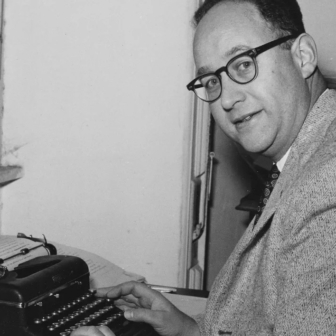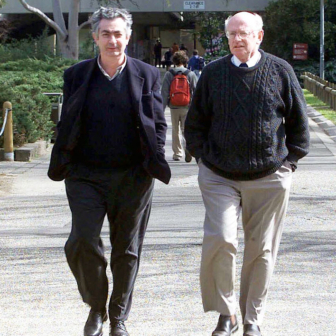On 17 October the popular German weekly magazine Der Spiegel ran a story about a scandal brewing within the German historical profession. Götz Aly, a prominent and controversial historian-cum-journalist, had made it known that he intended to present evidence at a forthcoming international conference that would impugn one of Germany’s leading centres of historical research, the Munich-based Institut für Zeitgeschichte, or Institute for Contemporary History.
Established with government funding more or less simultaneously with the creation of West Germany in mid 1949, the IfZ was charged with leading the scholarly effort to confront Germany’s Nazi past. Initially, its researchers were hamstrung by a dearth of documentary material and by competing political and professional pressures, but by the mid 1960s more evidence had become available and attitudes had shifted. A younger generation of historians were more than willing to investigate National Socialist crimes, and the West German public was more receptive to their findings.
Still, despite an unchallenged reputation that extends well beyond Germany’s borders, the IfZ’s work has sometimes proved controversial. Its decision to publish an annotated version of Adolf Hitler’s autobiographical work Mein Kampf — a book banned under Germany’s strict laws prohibiting hate speech — last year ultimately led to a stand-off between political leaders and eminent scholars, even raising the possibility of criminal charges against the IfZ.
A decade earlier, in his book The Holocaust and the West German Historians, the historian Nicolas Berg had accused the IfZ of failing to lay bare the worst of Nazi crimes — the “Final Solution” — far earlier, and of focusing excessively on potentially redemptive topics such as German anti-Nazi resistance. Berg also alleged that Martin Broszat, the IfZ’s director from 1972 to 1989, had applied to join the Nazi Party in 1944 — and had kept this application a secret throughout his life.
More damningly, Berg uncovered evidence that in the late 1950s and early 1960s the IfZ, and Broszat in particular, was unfairly dismissive of the work of Polish-Jewish historian Joseph Wulf. Better known were Broszat’s calls in the mid 1980s for the Nazi period to be “historicised” — treated using the same approach as would be applied to any other period of history — and his thinly veiled swipes at Jewish scholars (particularly Saul Friedländer), whose “mythical memories” of the Holocaust, he alleged, acted to “coarsen” their scholarship.
It was in this context that Götz Aly made his announcement last month. As Der Spiegel portentously put it, “New documents have come to light — and there is a horrible suspicion in the room.”
The documents in question are internal evaluations written (allegedly) by Martin Broszat in 1964, and by IfZ historian Ino Arndt in 1980. The reports examine the Austrian-born, US-based historian Raul Hilberg’s book The Destruction of the European Jews, which is acknowledged to be a (if not the) pioneering work of Holocaust history. Hilberg’s 1300-page work, published in English in 1961, provided an analytical framework for researching the Holocaust and became the standard point of reference.
Aly alleges that the IfZ “thwarted” the early translation of Hilberg’s work for the West German market. According to Der Spiegel, its treatment of Hilberg’s book, alongside its refusal to endorse the translation of an earlier work by British historian Gerald Reitlinger, who was also Jewish, and its prior dealings with Joseph Wulf suggest that the IfZ has a “dark” (and possibly anti-Semitic) page in its history.
Here, I’ll focus on the 1964 “advisory” note, for several reasons. First, it was written soon after the events it discusses, allegedly by one of the IfZ’s leading historians, Broszat. Second, it gives me a chance to discuss a document — a copy of that very note — which I happen to have had in my possession for several years. (When I came across it as a PhD student in the IfZ archive, it struck me as a fascinating piece of evidence, though I couldn’t ultimately squeeze it into my thesis.) And, finally, I want to focus on that document since it is my view that the Der Spiegel article and Götz Aly misrepresent its contents and significance and draw incorrect (if not slanderous) conclusions.
The document in question (available in German at perlentaucher.de, pages 24 to 25) is an unsigned, undated file note, apparently with pages missing. It is unclear how Aly was able to attribute its authorship so definitely to Broszat, especially given that the original document was found in the personal papers of long-time IfZ director (1959–72) Helmut Krausnick.
The note is in fact quite complimentary about Hilberg’s work, praising the book as “well-researched” and “remarkably objective,” and noting that it represents the first “comprehensive overview” of the European-wide persecution and extermination of Jews. It acknowledges the fact that the book had informed the IfZ’s own advice to various government agencies.
Where criticism is made, it is not of Hilberg’s scholarship but of his alleged ignorance of certain sources of evidence known to be accessible at the time. Hilberg relied on the Nuremberg trial documents and existing secondary literature, the note claims, while neglecting other, unnamed but available, records. He restricted himself, it argues, to the “technical–organisational aspect of the extermination of Jews.” All in all, this is in line with characterisations of Hilberg’s work at the time (and since).
The note also claims that Hilberg, with his focus on these technical considerations, overlooks the connection between the “Final Solution” and “National Socialist policies on a general level.” As a result, his treatment of the early stages of the Nazi persecution of Jews and its “intellectual preconditions” is cursory, and he examines how the program of extermination was carried out “only in passing.” For the note’s author, by contrast, “the connection between the persecution of Jews and the structure of the Nazi regime is… at the centre of current research.”
These concerns are accompanied by a foreshadowing of the publication “in the near future” of better-informed work “with respect to the persecution of Jews,” including from the IfZ, which would put to rest the repeated accusation that West German historians were “dodging” the topic. Though it acknowledged that these accounts would be less detailed than The Destruction of the European Jews, it anticipated that they would adopt a “modern perspective, one that emphasises the political aspects of Jewish persecution.” It was further hoped that West German historians would avoid the “mere description,” as opposed to historical analysis, that characterised earlier efforts.
It was for that reason — the promise of new West German scholarship — that the author of the IfZ file note concluded there was no need to translate Hilberg’s book. Yet the note conveys no sense of urgency about that research and, in the event, those publications never appeared.
The note’s author, and the IfZ leadership generally, must surely have recognised that Hilberg’s influential work could and should have influenced West German scholarship and the public perception of Nazi crimes. Apathy, indifference, misguided priorities and even intellectual cowardice are all, to an extent, evident in the 1964 note.
Yet these are not the only or primary conclusions reached by Der Spiegel and by Aly. While conceding that the note’s author acknowledges the quality of Hilberg’s work, Der Spiegel concludes that the IfZ “would not have expected [this achievement] from a Jewish colleague.” Indeed, by linking this note with what is known of Broszat’s sometimes less-than-courteous treatment of Jewish colleagues, Der Spiegel reaches the conclusion that “his attitude towards Jewish historians may explain why the IfZ was against the acquisition of Hilberg’s work.”
Attitudes like those allegedly expressed by Broszat in this note are not atypical of the IfZ, says Der Spiegel, and nor is it a mere coincidence that the scholars being criticised were all of Jewish extraction. Rather, it argues, the file note fits within a more or less systematic policy of “scholarly tribalism” that excludes Jewish colleagues, and treats their scholarship as tainted by emotion.
Aly duly made his presentation at the Berlin conference on 18 October, the day after the Der Spiegel article appeared. The conference, titled Raul Hilberg and Holocaust Historiography, was timed to coincide with the anniversary of Hilberg’s death in 2007, and was attended by many of the world’s leading historians of Nazi Germany. Aly’s paper was unambiguously titled “How and Why the Institut für Zeitgeschichte Thwarted the Translation of Hilberg in 1964 and 1980.”
The paper is available in full online. Although Der Spiegel’s reporter has made a number of outrageous claims based on mere suggestions in Aly’s paper — such as the implication that Broszat was surprised at the quality of Hilberg’s scholarship given the latter’s Jewish background — Aly seems to have pulled few punches himself.
He describes the efforts to prevent a translation of Hilberg’s book from entering the German market as a “historians’ disgrace” that should be “condemned.” The IfZ historians, according to Aly, were “defending their market interests,” and used various arguments “to fence off their own backyards from (in this case Jewish) colleagues in order to protect their reputation and interpretative monopoly.” Hilberg, says Aly, “did not fit within the intellectual community built by contemporary historians” in West Germany.
While this is an unfavourable verdict, it seems to acquit the IfZ of the many egregious sins Der Spiegel claims it committed with respect to Hilberg’s work. Yet Aly’s argument goes wider. He claims that the IfZ, fifty-six years after Hilberg’s book first appeared, has failed to produce a work on the “Final Solution” of similar quality — a plainly misleading charge given the advances in historical scholarship in the subsequent five decades. And he concludes that, with the benefit of hindsight, “it does not look good for those seen to be the ‘emperors’ of contemporary German history at the time” — the IfZ, that is — because “instead of new clothes, they are standing there naked.”
Accounts suggest that Aly’s paper was not particularly well-received by the learned audience. The fact that Hilberg’s book was not translated into German until 1982 wasn’t news to anyone present. One audience member tells me that Aly’s perceived failure to contextualise his findings adequately came under particular criticism.
It takes little research and even less imagination to see why that is a powerful point of objection. Aly not only rips the 1964 file note entirely out of its historical context — a cardinal historiographical sin — but uses it to suggest, dubiously, that the treatment of Hilberg’s work must have been motivated by some form of anti-Semitism. The claim is far-fetched at best, and sloppy practice from someone claiming to be a professional historian.
History can’t rest on single pieces of evidence, and it is incumbent on historians to highlight ambiguity and to exercise great caution in reaching conclusions. A little additional research on Aly’s part would have revealed many of the intricacies in play at the advisory board level of the IfZ in the mid 1950s, when the IfZ’s approach to its subject matter was still evolving. The director of the institute at this time was Paul Kluke, a man who had no designs on the top job but was thrust into the position following the untimely death of Hermann Mau in October 1952.
By the mid 1950s, with the documentary evidence in the hands of the Western allies finally returned, Kluke began to express concern that the IfZ was neglecting its political mandate and risking damage to its scholarly credentials by failing to confront the topic of Nazi atrocities. At a meeting in July 1955, he expressed his “personal view” that anti-Semitism and the Nazi anti-Jewish laws, and their effects, should be the focus of “the broadest possible research,” and that tackling these subjects “must be the primary task of the Institute.” He had detected an emerging perception that “the Institut has utterly disgraced itself” by not undertaking what should be a pressing task.
At this meeting, a collaboration was flagged with the London-based Wiener Library to produce one of the “future publications” to which the 1964 file note referred. It’s therefore plausible to conclude from the file note that the IfZ was determined to produce a book that would outshine Hilberg’s work, one that would (unlike Hilberg’s) exhaust all available resources and employ the latest models of structural and political analysis.
Despite the note’s resolute tone, the collaborative work with the Wiener Library never eventuated. Much of the IfZ’s apathy towards a head-on scholarly confrontation of Nazi crimes in the 1950s can be attributed to the ongoing and powerful influence of older historians such as Hans Rothfels, and the inaccessibility of documentary evidence. By contrast, where the political will existed to publish works on resistance and anti-Nazi activities — the priorities of a scholar such as Rothfels — a way was found to gather the required evidence.
Only improved evidentiary conditions and some generational change within the IfZ in the late 1950s facilitated a gradual but increased willingness to prioritise research on Nazi crimes. With a new director and a slight diminution of the influence wielded by an ageing Rothfels, circumstances were shifting.
It was at this point, in the early 1960s, that the question of Hilberg’s translation came into the picture. Adding in some of this context makes the 1964 document seem far less insidious. It reveals an institute attempting to protect its own research interests while finally (and, admittedly, belatedly) starting to grapple with the topic of Nazi atrocities.
Unsurprisingly, the IfZ has not reacted positively to Aly’s conclusions, nor to his approach in airing them. Referring to what it describes as the “whistle-blowing rhetoric” Aly used to “leak” and “embellish” his forthcoming lecture, the IfZ says that the Hilberg episode requires contextualisation. There are reasons why the translation was not undertaken, the IfZ claims, and they fit within a generally “distant” response to Hilberg’s book exhibited by academics and publishers alike in the 1960s.
Most perplexing of all is Der Spiegel’s claim that the IfZ plans to conduct “intensive” research into its own history “with external scholars,” and is even considering the formation of an “historical commission.” It adds: “For the establishment on Leonrod Street [where the IfZ is located] the work of such a committee would be a new experience: not putting the history of others under the microscope — but its own.”
Predictably, and consistent with much of this story, there is no evidence beyond the Der Spiegel article that the IfZ holds or has expressed any such intention. ⦁




